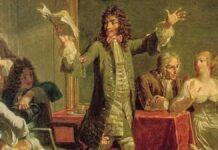Act 2, Scene 2 of William Shakespeare’s Julius Caesar is a pivotal scene in the play, marked by rich symbolism, foreshadowing, and character development. This scene is significant for several reasons, as it sets up crucial events and reveals critical aspects of characters, notably Julius Caesar and his wife, Calpurnia.
In this scene, Caesar’s wife, Calpurnia, has woken the house three times with nightmares about Caesar’s death. Caesar remarks on the stormy night and his wife’s bad dreams. He asks the priests to sacrifice an animal to see what the future holds for him. Calpurnia enters and begs Caesar not to go to the senate that day, as she has a strong feeling he will be in danger because of a bad dream. Caesar insists that he is unafraid and boasts that he is indestructible. The priests report that they found no heart in the sacrificed animal, which Caesar interprets as the gods rebuking any potential cowardice. Still, Calpurnia insists he stays home, and Caesar agrees, sending Mark Antony to explain to the senate that he is unwell.
Decius Brutus, one of the conspirators, arrives, and Caesar instructs him to announce to the rest of the senators that he will not come that day simply because he doesn’t want to. But Decius warns that the senators will mock Caesar and offers a more favourable interpretation of Calpurnia’s dream. Thus, Decius changes Caesar’s mind. Calpurnia is once again ignored. Caesar agrees to go to the Capitol, and several conspirators and Mark Antony arrive to accompany him. Caesar invites them in for wine before they go.
Foreshadowing and Warning
Calpurnia’s dream is a powerful instance of foreshadowing, hinting at Caesar’s impending assassination. In her dream, Calpurnia envisions a statue of Caesar spouting blood from a hundred spouts, with Romans smiling and bathing their hands in the blood. This vivid and disturbing imagery warns of the violence and betrayal that await Caesar.
Calpurnia’s Intuition and Concerns
Calpurnia’s dream reflects her intuition and deep concern for her husband’s safety. She senses the looming danger and urges Caesar to stay home, fearing that venturing out on the Ides of March will lead to his demise. This showcases Calpurnia’s love and loyalty towards Caesar and her ability to perceive the ominous signs that others might overlook.
Symbolism and Imagery
The dream is rich in symbolism and imagery. The statue of Caesar spouting blood symbolizes his impending death and the chaos that will engulf Rome. The Romans bathing their hands in Caesar’s blood represent the conspirators who will be responsible for his assassination, as well as the wider civil unrest that will follow.
Caesar’s Hubris and Vulnerability
Despite Calpurnia’s pleas and the unsettling nature of her dream, Caesar ultimately dismisses her concerns, revealing his hubris and sense of invincibility. He believes that he is above superstition and that the warnings do not apply. This decision exposes Caesar’s vulnerability and sets the stage for his tragic downfall.
Superstition vs. Reason
This scene showcases the conflict between superstition and reason. Calpurnia, terrified by omens and nightmares she has experienced, urges Caesar to stay home. In contrast, Caesar first dismisses her fears, showing his rational side, but he is also concerned with how his public image might be affected if he appears cowardly.
Manipulation and Persuasion
The scene also well illustrates how Caesar can be manipulated. Despite his initial decision to heed Calpurnia’s warning, he is easily swayed by Decius Brutus’s reinterpretation of Calpurnia’s dream, which appeals to Caesar’s vanity and concern with how history will perceive him.
Portents and Omens
Act 2, Scene 2 is filled with references to supernatural signs. Shakespeare uses these omens to create a foreboding atmosphere, indicating that the events of the Ides of March will have a monumental impact. The inclusion of Calpurnia’s prophetic dream highlights the belief in supernatural elements and the significance of omens and prophecies in ancient Roman society. It showcases how dreams, visions, and other portents were taken seriously and interpreted as messages from the gods or warnings of future events.
Tension and Dramatic Irony
Calpurnia’s dream heightens the tension in the play, as the audience is aware of the impending danger that Caesar faces. It creates a sense of dramatic irony, where the audience knows more than the characters on stage. The dream also adds to the overall atmosphere of foreboding and impending doom that permeates the play.
The Role of Women
Calpurnia’s character is a vehicle for expressing the emotional and intuitive responses to the unfolding events. Her concerns, juxtaposed with the male-dominated political intrigue, underscore Shakespeare’s exploration of gender roles.
Scene’s Impact on the Play
This scene significantly advances the plot, setting Caesar on a collision course with his assassins. It reveals the internal conflicts of the characters and the forces at play and establishes the themes of fate, free will, manipulation, and the dangers of unchecked ambition.
Calpurnia’s dream in Act 2, Scene 2 serves as a critical moment of foreshadowing, symbolism, and character development in Julius Caesar. It adds depth to Calpurnia’s character, highlights Caesar’s hubris, and heightens the tension and dramatic irony in the play. The dream also underscores the broader themes of fate, prophecy, and the consequences of ignoring warning signs, which are central to the tragic narrative of the play. The scene advances the plot towards its tragic climax and deepens the audience’s understanding of the characters and the impending consequences of their actions.





























